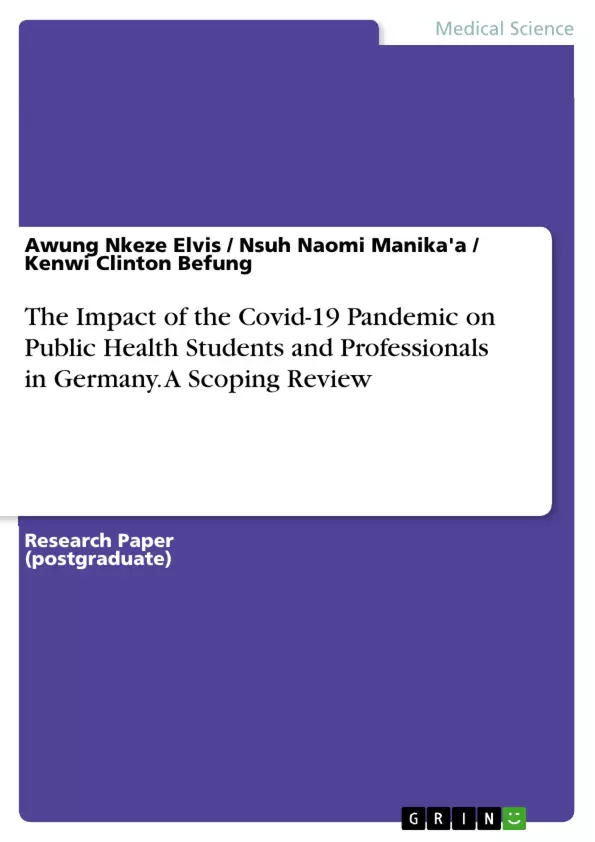This scoping review investigates the impact of the COVID-19 pandemic on public health students and young professionals in Germany. Drawing from 12 selected studies, it maps out key concepts, types of evidence, methodological approaches, and research gaps. The review highlights resilience and innovation demonstrated by public health institutions, including virtual learning platforms, mental health support services, and flexible work arrangements. Collaboration between educational institutions, professional organizations, and government agencies has led to comprehensive support systems, emphasizing tailored assistance for well-being and academic success. These adaptations not only addressed immediate challenges but also equipped the future public health workforce with essential skills for a post-pandemic world, emphasizing the importance of innovation and tailored support for a resilient healthcare workforce.
Inhaltsverzeichnis (Table of Contents)
- ABSTRACT
- ABBREVIATIONS
- INTRODUCTION
- METHODOLOGY
- RESULTS, METHODS AND LIMITATIONS OF THE SELECTED 12 STUDIES
- DISCUSSION AND IMPLICATIONS
- CONCLUSION
- REFERENCES
- Peer review
Zielsetzung und Themenschwerpunkte (Objectives and Key Themes)
This scoping review aims to comprehensively explore the impact of the COVID-19 pandemic on the public health workforce in Germany, focusing on students and young professionals. It investigates how the pandemic has affected their training and education, the challenges they face, and how public health institutions and organizations have adapted their support systems in response.
- Impact of COVID-19 on public health students and young professionals' training and education in Germany
- Challenges faced by public health students and young professionals due to the pandemic
- Adaptations in support systems by public health institutions and organizations for students and young professionals in response to COVID-19
- Resilience and innovation demonstrated by public health institutions and organizations
- The future of the public health workforce in a post-pandemic world
Zusammenfassung der Kapitel (Chapter Summaries)
The review begins with an introduction that outlines the research questions and the rationale for using the PRISMA-ScR checklist for a robust scoping review. It highlights the significance of the topic and the methodology's suitability for exploring the multifaceted impact of the pandemic on public health students and young professionals.
The methodology chapter discusses the chosen scoping review approach, emphasizing its comprehensiveness, ability to identify knowledge gaps, and suitability for informing policy and practice. The rationale for using the PRISMA-SCR checklist for reporting is also explained. This chapter provides a detailed overview of the review's methodology and the justification behind its chosen approach.
The results chapter presents a comprehensive analysis of the 12 selected studies, summarizing their findings and methodological approaches. It maps out key concepts, types of evidence, and identifies research gaps and needs. This section provides insights into the findings and limitations of the reviewed studies.
The discussion and implications chapter analyzes the collective findings of the selected studies, highlighting significant trends, and drawing out implications for policy and practice. It explores how the pandemic has impacted the public health workforce in Germany and what steps can be taken to address these challenges.
Schlüsselwörter (Keywords)
The main keywords and focus topics of the scoping review include: COVID-19 pandemic, public health workforce, students, young professionals, Germany, training, education, challenges, public health institutions, organizations, support systems, scoping review.
- Quote paper
- Awung Nkeze Elvis (Author), Nsuh Naomi Manika'a (Author), Kenwi Clinton Befung (Author), 2024, The Impact of the Covid-19 Pandemic on Public Health Students and Professionals in Germany. A Scoping Review, Munich, GRIN Verlag, https://www.grin.com/document/1453360



